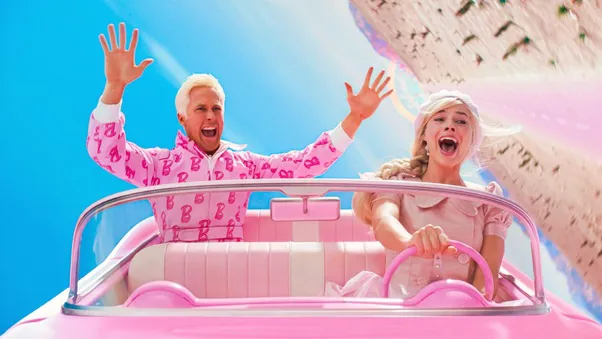*Barbie* is a baffling and bizarre film—and I kind of loved it. I’m genuinely surprised Mattel approved something so unconventional for their flagship Barbie movie, but I’m glad they did. Somehow, the company fully embraced an existential, meta-comedy exploring the contradictions of identity and society. For kids.

After an extended parody of *2001: A Space Odyssey*, we're introduced to Barbieland—a surreal, metaphysical realm connected to our own and inhabited entirely by anthropomorphic versions of Mattel's Barbie dolls. In Barbieland, every day is identical and endlessly perfect—at least for the Barbies. The Kens, on the other hand, don’t appear to have homes or much purpose.
Amid a cheerful dance number, the iconic Stereotypical Barbie—the image most people associate with the brand—is suddenly overwhelmed by intrusive thoughts of death. To the shock of everyone around her, her permanently arched feet go flat, a clear sign that something is deeply wrong.
Seeking answers, Barbie visits Weird Barbie, a doll who’s been "played with too hard" and now lives on the outskirts of Barbieland alongside other discontinued Barbies and Kens. Weird Barbie reveals that Barbie's existential crisis stems from the emotions of the person playing with her in the real world—someone who is deeply unhappy. The only way for Barbie to heal is to venture into the real world and help that person. And so, Barbie embarks on a journey of self-discovery, accompanied by Beach Ken, who tags along simply because he has nothing else to do.

Barbie is thoroughly disillusioned by the real world. Instead of the utopia she imagined, she finds a place where things are far from perfect and the issues the Barbies believed they had solved still persist. Meanwhile, Ken is delighted to discover a society where men hold power and prestige. Enamored by this concept, he brings a warped version of the patriarchy back to Barbieland—though in his interpretation, it heavily revolves around horses.
This film is undeniably strange. A major character is a ghost who, oddly enough, has committed tax fraud. Characters rollerblade freely between worlds. There’s a full-blown musical number devoted entirely to Ken. Mattel, oddly prepared, keeps life-size doll boxes on hand in case Barbies cross into the real world. At one point, Barbie is called a “fascist.” The patriarchy, as reimagined by Ken, is dripping in country-western flair. Barbie even faces a Matrix-style choice but keeps reaching for the blue pill. Throughout it all, the recurring thought is: *What movie is this? And how on Earth did Greta Gerwig convince Mattel to go along with it?* While stories about fictional characters entering the real world aren’t new, *Barbie* takes that concept to wonderfully absurd new heights.
The film's true standout, however, is its set design. Barbieland is a visual marvel—a dazzlingly vibrant, meticulously crafted world that perfectly captures the essence of Barbie’s Dreamhouse. Everything is intentionally artificial, yet it resonates with a surprising sincerity. Gerwig’s direction brilliantly balances this whimsical, offbeat tone with the more grounded and melancholic atmosphere of the real world. The film poignantly explores how flawed reality can be just as meaningful—and beautiful—as a glossy fantasy.
If the movie falters, it’s in its pacing. It’s bursting with ideas and transitions rapidly from one concept to the next, which occasionally leaves emotional moments and character development underexplored. A subplot about a mother reconnecting with her daughter, for example, feels hurried and underdeveloped, missing the emotional depth it clearly aims for.
Still, *Barbie* is an audacious, imaginative, and often hilarious cinematic experience that defies expectations at every turn.

I had a blast watching *Barbie*. In an era dominated by carefully controlled adaptations of existing franchises aimed at squeezing endless profits, Mattel took a bold risk letting Greta Gerwig completely unleash her creativity on their most iconic property. The result is a strange and wonderful film where characters openly say “penis” and “vagina”—quite surprising for a PG-rated movie.
(On a side note, it’s hilarious that Ben Shapiro got upset about the film’s portrayal of the patriarchy. The patriarchy is literally a joke in the movie, so you’d think if he’s bothered by it, he must believe it’s both significant and real—though I’m pretty sure he argues it doesn’t even exist.)
